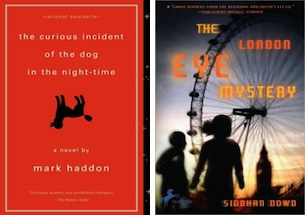As the parent of a 19-year-old with autism and one of the founders a center for children and young adults with disabilities in Western Massachusetts, I know first-hand that kids with disabilities may not have bodies that work or brains that pick up on social cues. I also know we live in a world with people who too often see a person with a disability and think, “Oh, that’s sad…” But these kids have lived with difference all their lives—and the stares that go along with this—so they tend to be surprisingly less self-conscious than their peers. For most of them, their life stopped feeling like a tragedy a long time ago. The children often lead the way in teaching their parent this lesson: I’m not sad about what I can’t do so you shouldn’t be either—now let’s get on with life and do what I can…
Not caring what others think—especially in the world of teens—is a form of empowerment. So is living outside the stifling norms of society’s expectations (witness every superhero who is relegated to living in a cave or a sewer). Because I write realistic fiction and therefore read mostly realistic fiction, and because I often feature characters with disabilities at the center of my stories, I sometimes wonder if the idea of having a character empowered by their disability springs from this determination to live a full life in spite of what might look like serious limitations.
Differentness enables you to rise above the rest of us. It makes sense that these stories—primarily written for younger people—point this out in such a compelling way:
Percy Jackson series by Rick Riordan
 Here Riordan, writing for his own son with learning disabilities, brilliantly theorizes that ADHD and other attending learning disabilities might all spring from being secretly half-ancient God. The inability to sit still in class or pay attention to a boring teacher isn’t a weakness, it’s your genetically-endowed, immortal superpowers itching to be used.
Here Riordan, writing for his own son with learning disabilities, brilliantly theorizes that ADHD and other attending learning disabilities might all spring from being secretly half-ancient God. The inability to sit still in class or pay attention to a boring teacher isn’t a weakness, it’s your genetically-endowed, immortal superpowers itching to be used.
El Deafo by Cece Bell
 In this much-celebrated graphic memoir for middle-grade readers, Cece Bell recalls her own childhood spent with hearing impairment. In this case, she turns the “Phonic Ear” hearing aid she was forced to wear as a child—an unwieldy device attached to her chest—into a superpower that allows her to hear her teacher’s private conversation (after they’ve forgotten to turn their microphones off.) Her “power” is, in part, what many disabled kids have: access to and an understanding of the adult world that her peers don’t share.
In this much-celebrated graphic memoir for middle-grade readers, Cece Bell recalls her own childhood spent with hearing impairment. In this case, she turns the “Phonic Ear” hearing aid she was forced to wear as a child—an unwieldy device attached to her chest—into a superpower that allows her to hear her teacher’s private conversation (after they’ve forgotten to turn their microphones off.) Her “power” is, in part, what many disabled kids have: access to and an understanding of the adult world that her peers don’t share.
Forrest Gump by Winston Groom
 Technically, Forrest’s “superabilities” are never explained beyond the idea that he’s too cognitively disabled to realize he shouldn’t be able to do any of the countless feats he stumbles into and succeeds at: long distance running, football championships, war heroism, business success. By never accepting his limitations, he seemingly has none, a reminder to us all of how crippling self-doubt really is.
Technically, Forrest’s “superabilities” are never explained beyond the idea that he’s too cognitively disabled to realize he shouldn’t be able to do any of the countless feats he stumbles into and succeeds at: long distance running, football championships, war heroism, business success. By never accepting his limitations, he seemingly has none, a reminder to us all of how crippling self-doubt really is.
Matt Murdoch (Daredevil) created by Stan Lee and Bill Everest
 After an accident with radioactive material leaves him blind, his four remaining sense begin functioning at a super-human capacity. He can smell well enough to follow suspects through a crowd; later, he can tell when suspects are lying by hearing the changes in their heartbeat. In a glorious nod to weakness-becoming-strength, the cane he uses for mobility also functions as his signature weapon, containing steel cables and grappling hooks for capturing criminals.
After an accident with radioactive material leaves him blind, his four remaining sense begin functioning at a super-human capacity. He can smell well enough to follow suspects through a crowd; later, he can tell when suspects are lying by hearing the changes in their heartbeat. In a glorious nod to weakness-becoming-strength, the cane he uses for mobility also functions as his signature weapon, containing steel cables and grappling hooks for capturing criminals.
The Curious Incident of the Dog in Night Time by Marc Haddon and The London Eye Mystery by Siobhan Dowd
 These books are both realistic mysteries so, technically-speaking, no superpowers are evoked when their main characters—both teens with Aspergers (high-functioning autism) solve their crimes, but I’ve included them here because both books so beautifully depict the world through this mind-set and the limitations it imposes, that when they break out of their ritualized comfort zones to solve their crimes, it feels as if something superhuman has taken place. Both books also take care to plot the stories so that only these boys—with their alternative-but-not-less-than abilities—really are the only ones capable of doing the work they’ve just done.
These books are both realistic mysteries so, technically-speaking, no superpowers are evoked when their main characters—both teens with Aspergers (high-functioning autism) solve their crimes, but I’ve included them here because both books so beautifully depict the world through this mind-set and the limitations it imposes, that when they break out of their ritualized comfort zones to solve their crimes, it feels as if something superhuman has taken place. Both books also take care to plot the stories so that only these boys—with their alternative-but-not-less-than abilities—really are the only ones capable of doing the work they’ve just done.
Cammie McGovern is the author of A Step Toward Falling, Say What You Will as well as the adult novels Neighborhood Watch, Eye Contact, and The Art of Seeing. Cammie is also one of the founders of Whole Children, a resource center that runs after-school classes and programs for children with special needs. She lives in Amherst, Massachusetts, with her husband and three children.










